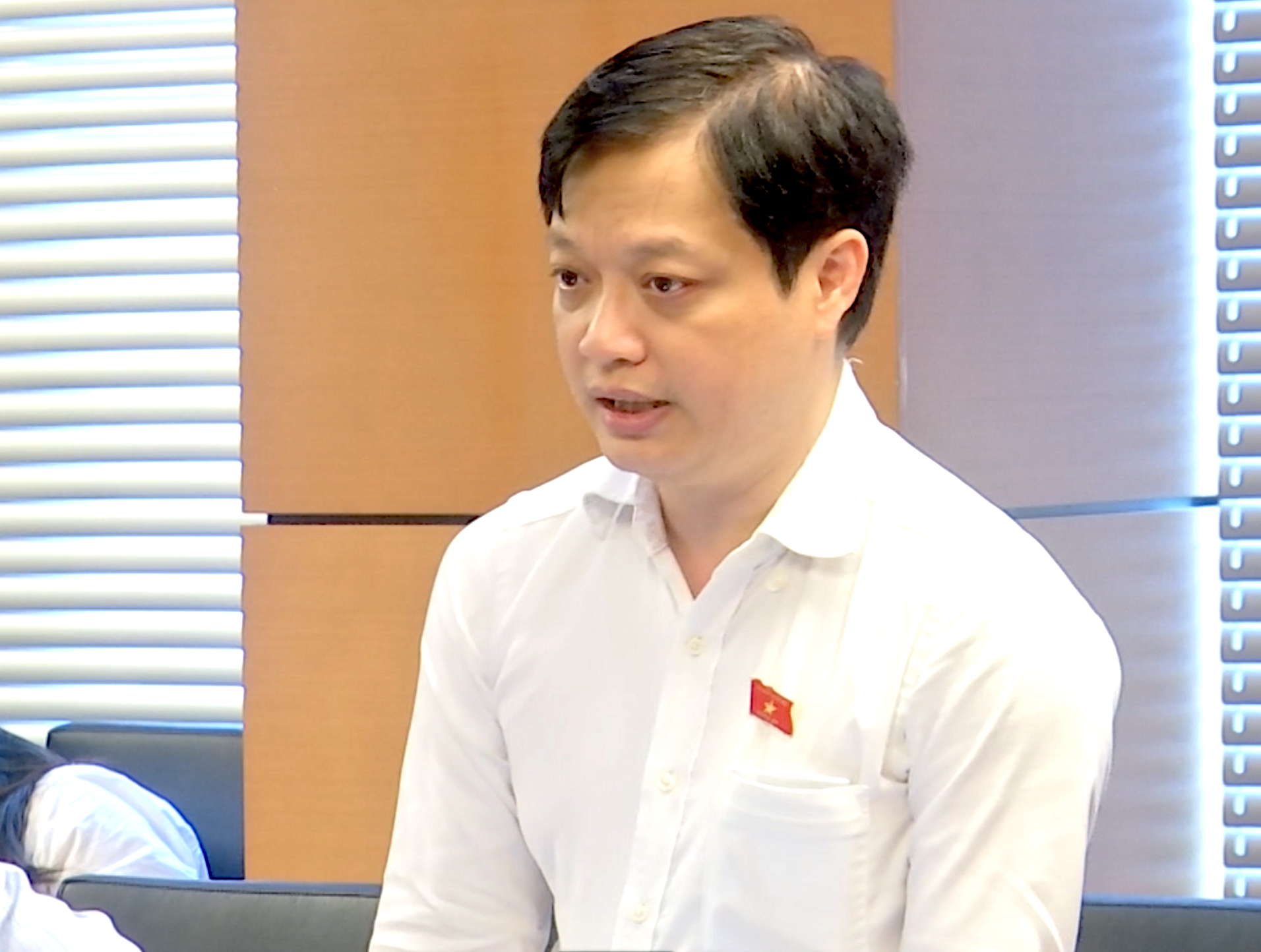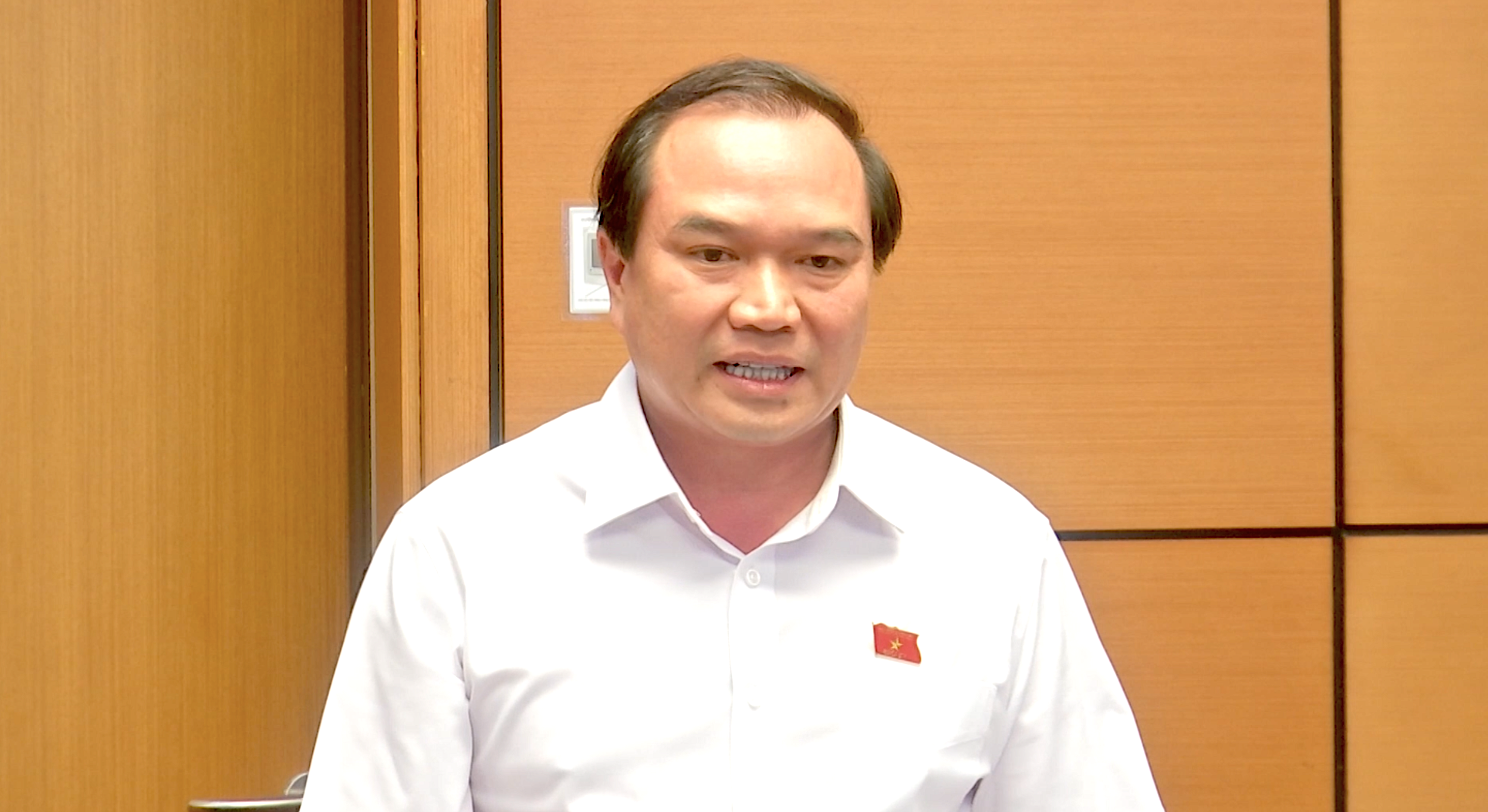The delegation of National Assembly deputies from Hue City participated in discussions in Group 7 along with delegations from Thai Nguyen, Lang Son, and Kien Giang .
Resolution 68 – a correct policy.
During the discussion on the draft Resolution of the National Assembly on mechanisms and policies for the development of the private economy, all National Assembly deputies agreed that Resolution 68 of the Politburo on the development of the private economy is an extremely correct policy, especially in the context of the economy being affected by many external factors.
 |
| Representative Nguyen Hai Nam ( Hue City National Assembly Delegation) proposed a three-year tax exemption for innovative start-up businesses. Photo: Provided by Hue City National Assembly Delegation. |
Representative Nguyen Hai Nam (Hue City National Assembly Delegation) analyzed: The three main economic sectors currently are the state, FDI, and private – each with its own role. However, reality has shown that both the state and FDI sectors have limitations, especially their dependence on capital, technology, and international markets.
"When the world is in turmoil, what doesn't belong to us will no longer be a support. We must develop a strong private economy with genuine competitiveness before we can talk about self-reliance and self-strength," Mr. Nam said.
Sharing the same viewpoint, delegate Nguyen Cong Hoang (National Assembly delegation of Thai Nguyen province) cited examples from major economies such as the US, EU, and Japan – where the private sector contributes up to 68% of GDP, creates the majority of jobs, and is the "cradle" that gave birth to giant corporations like Apple, Amazon, Alibaba, and Samsung.
According to Mr. Hoang, those brands were established not by luck, but thanks to a stable, long-term, and effective legal and policy ecosystem. If Vietnam wants to have "its own Apples," it must also start with policy.
“We cannot plant a tree and then leave it to survive the storms of bureaucracy, lack of capital, lack of land, and lack of brand protection,” delegate Nguyen Cong Hoang said, using an analogy during the discussion. He wasn't speaking specifically about anyone or just one particular business. But that image of a “young tree” is an accurate metaphor for millions of small and micro-private enterprises – a force expected to become one of the three pillars of Vietnam's economic development in the new era.
A prominent proposal from delegate Nguyen Hai Nam is to abolish the "investment policy approval" procedure for projects that do not use state capital. This procedure, once expected to help tightly manage capital flows, has now become a "straitjacket" that stifles the development of private enterprises.
Mr. Nam analyzed: Contents such as location, objectives, scale, capital… are clearly regulated by specialized laws. Technical appraisal, environmental impact assessment, planning… are all handled by relevant agencies. “There’s no reason to need another layer of ‘permission’ to get investment,” Mr. Nam said; and emphasized: “This isn’t just theory, reality proves it. According to a report by the National Assembly’s Economic Committee, there are currently more than 2,000 projects stalled due to investment approval procedures. Many investors have spent years without being able to start construction. “Every day of delay adds to costs and is a lost opportunity. Businesses cannot wait forever,” Mr. Nam stressed.
 |
| Representative Nguyen Cong Hoang (National Assembly Delegation of Thai Nguyen province) speaks at the group discussion session. Photo: Provided by the National Assembly Delegation of the city. |
Post-inspection replaces pre-inspection.
Citing the spirit of General Secretary To Lam's article on Resolution 68, delegate Nguyen Hai Nam argued that shifting the entire administrative process to post-audit is a necessary step, consistent with international practices and especially suitable for Vietnam's rapidly developing digital economy.
He agreed with the view that freedom of business is inherent and can only be restricted for truly exceptional reasons such as national defense, security, ethics, public health – and such restrictions must be clearly defined in law.
"If you can't manage it, ban it; if you can't grant it, force them to reapply – these mindsets need to be completely eliminated. Businesses don't fear management; they only fear being confused by overlapping procedures and conflicting laws," Mr. Nam said.
Members of Parliament also took time to discuss the biggest obstacle currently facing private businesses: access to resources.
Representative Nguyen Cong Hoang shared: Many small businesses, especially innovative startups, cannot borrow capital simply because they lack collateral. Innovations, technological models, and software copyrights – which are considered "gold" in the digital age – are not considered collateral by banks.
"We are forcing young entrepreneurs to have land ownership certificates before they can borrow capital to... develop technology applications. This goes against the principles of innovation," Mr. Hoang stated.
Representative Nguyen Hai Nam added: Not only capital, but also production space is a major obstacle. Many localities have land, but they don't allocate land appropriately for private enterprises. "We need flexible, transparent, and fair land policies for the private sector, not just prioritizing the state or FDI," Mr. Nam proposed.
Regarding taxation, Representative Nguyen Hai Nam also proposed exempting innovative startups from taxes for the first three years. "To strengthen the private economy, we must start with specific policies, remove real barriers, and provide support through mechanisms, not just slogans," Representative Nguyen Hai Nam emphasized.
Source: https://huengaynay.vn/chinh-polit-xa-hoi/theo-dong-thoi-su/go-nut-that-cho-kinh-te-tu-nhan-153625.html





























![[Photo] Prime Minister Pham Minh Chinh attends the Conference on the Implementation of Tasks for 2026 of the Industry and Trade Sector](/_next/image?url=https%3A%2F%2Fvphoto.vietnam.vn%2Fthumb%2F1200x675%2Fvietnam%2Fresource%2FIMAGE%2F2025%2F12%2F19%2F1766159500458_ndo_br_shared31-jpg.webp&w=3840&q=75)






































































Comment (0)